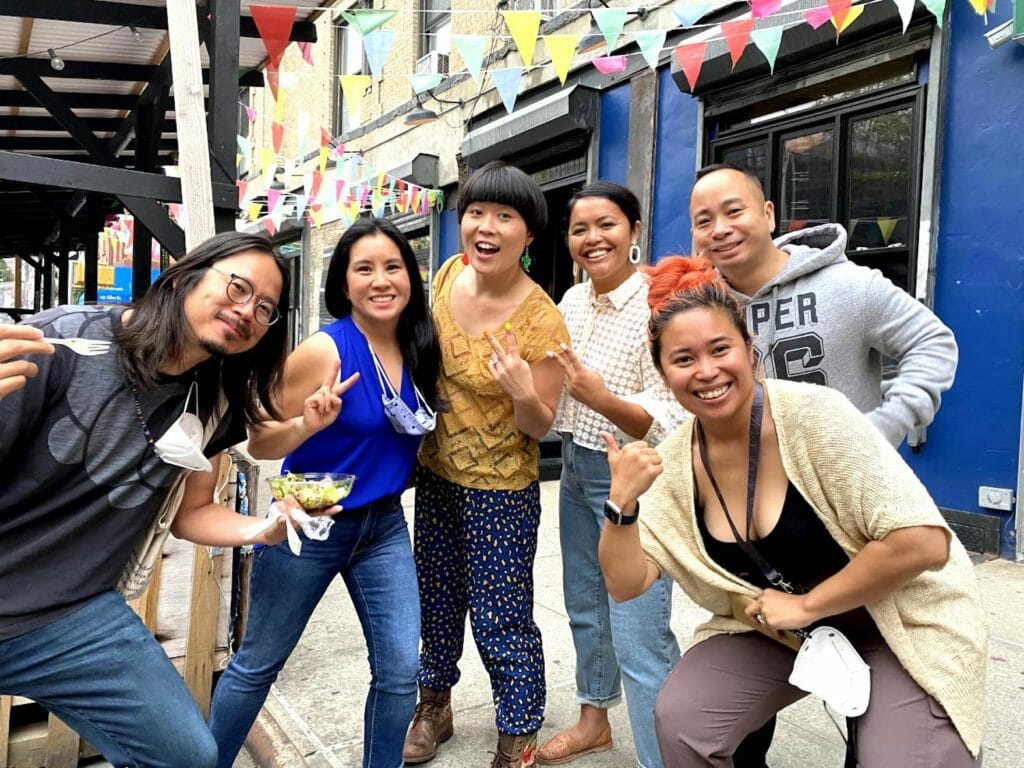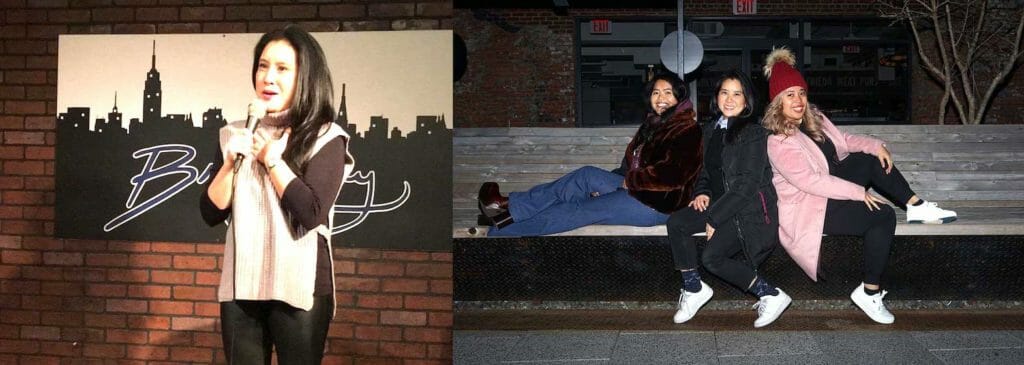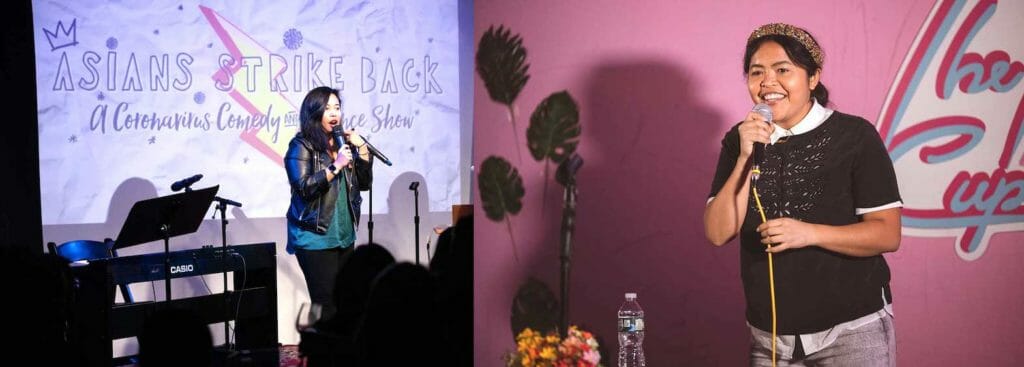NY Fil-Am comedy collective Banana Ketchup spreads the laughs

The Banana Ketchup comedy collective after one of its outdoors shows at Kabisera in Lower East Side New York with fellow Asian American comedians. CONTRIBUTED
NEW YORK — Despite the surging success of a new generation of Filipino American entertainers in Hollywood, from Saweetie to Olivia Rodrigo, breaking through is still a challenge for many Filipina or Filipinx comics who do sketch and stand-up comedy in the U.S.
Jo Koy may have recently called America’s attention to Filipino humor, but there is still a wide gap in the recognition of non-male Fil-Am stand-up comedians in mainstream media. When he performed his 2020 Netflix special In His Elements in Manila with a Fil-Am comic crew, none of those who shared the stage with him was female, queer or identify as non-binary.

Patricia Dinglasan performing in Broadway Comedy Club, one of Manhattan’s mainstage comedy clubs. (Right) Dominique Nisperos, Patricia Dinlasan, Kyle Marian Viterbo collectively called Banana Ketchup photographed in Dumbo, Brooklyn, NY Feb 2022. INQUIRER/Avery Cefre
In New York, however, the comedy landscape may be starting to change. A Filipino comedy collective calledBanana Ketchup is rising to the challenge of making a breakthrough.
Banana Ketchup was originally a personal project of Patricia Dinglasan, 45. It was formed at the height of pandemic as a fundraiser for a Filipino American who was running for public office in 2020. Dinglasan was later joined by Dominique Nisperos, 38, and Kyle Marian Viterbo, 35.
Banana Ketchup is an inclusive comedy experience bringing Filipinos, people of color and marginalized groups in a Filipino café Kabisera in Manhattan’s Lower East Side serving as its venue.
Kabisera is a cultural hub that is part of Project Barkada, a collaborative effort of Fil-Am small-business owners that came together to lift each other up during the onset of the pandemic. The project fortuitously offered a comedy show as part of the community it is building.
Patricia Dinglasan, ⅓ of Banana Ketchup
Patricia Dinglasan was born in the Philippines. Both her parents were already living in New York before she was conceived. Her parents thought that it may have been a good idea for her to be born in Manila for a foreseeable career in politics. She was a year old when they moved to the States and lived in California for a while, but going back and forth to Manila. She even attended part of her middle school years in the Philippines.
After finishing her undergraduate degree in UC Santa Cruz in 1998, she moved to New York for career opportunities. She worked in the beauty industry doing marketing and sales forecasting for Estee Lauder Companies, and had two kids before diving into comedy in 2018.
Dinglasan never thought of becoming an actor, much less of doing comedy. “My dad wanted me to be a doctor or engineer and my mom wanted me to just marry rich.” But Dinglasan wanted to try her hand on something else after she had her second child.
Her sister, Kelly, being one of her biggest supporters, had asked her in one of their pep talks: “What would you do if money wasn’t the point of your job?” Without a second thought, Dinglasan nonchalantly answered: “I want to be with people and make them laugh.” After that talk, her sister encouraged her to take a comedy class.
Dinglasan it was all done after taking a comedy class. She didn’t know about open mics and getting on shows in comedy clubs until 2018 when she met more comedians. Since then, Dinglasan has performed regularly in Manhattan comedy clubs like Stand Up NY, West Side Comedy Club and Greenwich Village Comedy Club, sharing the stage with John Oliver and Ronny Chieng.
Dinglasan considers herself more of a stand-up comic who delivers punch lines. Her comedic material focuses on her personal life, being a Filipina, a mom of two boys, a wife, her observations about politics both in the Philippines and the U.S. and being in an interracial marriage.
In 2020, Dinglasan wanted to start producing comedy shows, but then Covid disrupted everything. But everyone became creative and found an opportunity producing and performing shows in outdoor spaces. That’s when Banana Ketchup started, and she met Viterbo and Nisperos in the process.
Kyle Marian Viterbo, ⅔ of Banana Ketchup
Kyle Marian Viterbo was born and raised in Mandaluyong City. Her dad is from Roxas City, Iloilo while her mom is from Dipolog City in Zamboanga Del Norte. Her family moved from Manila to Queens, New York in 1995 through family ties, coming to the U.S. once their papers got done.
Viterbo got her undergraduate degree in Anthropology from New York University then continued towards a PhD in Human Evolution at Stony Brook University. She researched fossils from South East Asia, including The Philippines’ Tabon Cave, until she decided to switch careers via a masters in Science Communication in Scotland in 2015.
While living and studying in the UK for her master’s Viterbo got her start in comedy. “Growing up I didn’t think I was funny or creative. I was straight line going to be a scientist and I did it for five years before I went to Scotland. It wasn’t until I watched this woman at a nerdy Bright Club Comedy Show, making everyone laugh about the unnecessary torture of a dissertation defense, and I thought that was liberating.’
It inspired her to make people laugh with stories and experiences in science. “I love being able to unexpectedly teach somebody about something, whether it’s a character or sketch [comedy].”
Back in the UK, there were people doing nerdy stand-up and that didn’t exist in the U.S. in 2014. That’s when she thought about bringing academic, educational stand-up to New York and saw a lot of opportunities in it. Educational comedy is a brand of comedy that is meant to make you laugh and learn. Viterbo uses it to educate adults to laugh and think critically about the foundations of knowledge — from what museums are about to how race is really connected to science.
Viterbo had been producing her own shows since she came back to New York in 2015. In 2017, she began working with a comedy theater called Caveat that caters specifically to educational entertainment. Viterbo trains academics, scientists, professors and graduate students to communicate their research through comedy, to calm down their stage fright, and to help them make audiences care about their important research.
Viterbo made headlines in March 2020 for producing “Asians Strike Back: A Coronavirus Comedy & Science Show,” on the same night that NYC confirmed its first COVID patient, and just days before New York’s lockdown. It was a sold-out standup special that spotlighted the science of emerging diseases and virology while also tackling Asian hate.
Viterbo currently works as a science communicator for a national science media organization while trying to solidify her niche in producing and doing educational comedy in NYC.
Dominique Nisperos, 3 of 3 of Banana Ketchup
Dominique Nisperos, who identifies as non-binary, was born in Stockton, California, with a Filipino father and a Mexican mom. Nisperos’ Filipino grandfather was a guerilla fighter in World WarII, which gave their family access to American citizenship. In 1967, their father moved to the U.S. and ended up working in a cousin’s carrot farm in California. Her parents met at work.
Nisperos’ Mexican side of the family came to the U.S. in 1961 through the Bracero Program from the 1942 executive order called the Mexican Farm Labor Program. According to UCLA Labor Center, this program grew out of a series of bilateral agreements between Mexico and the United States that permitted millions of Mexican men to work legally in the United States on short-term labor contracts.
Nisperos started buying knock knock joke books at a young age, using it to entertain the family. At UC Berkeley in 2001, Nisperos joined an Asian American theater group that did stand up, improv and sketch comedy.
Prior to moving to New York in 2010 to attend a PhD program in Sociology, Nisperos lived in San Francisco’s Bay Area, working in politics and government and obtaining an undergraduate degree in Sociology and Ethnic Studies.
After graduating from college, comedy became more of a hobby. Moving to New York, which is saturated with comedy, Nisperos concluded that humor and scholarship could coexist: “If I studied colonization, I’ll do colonization humor.”
Nisperos dropped out of a PhD program in New York to pursue comedy full time, in the last six years creating more content for BIPOC, Mexican and Filipino folks and for people who don’t get representation in mainstream comedy. Nisperos is currently a freelance comedy writer and has written for YouTube creators and Blue Man Group
How Everyone met each other
Nisperos and Viterbo met at the then comedy school Upright Citizen’s Brigade (UCB) through a BIPOC class show called The Code Switch. Nisperos describes code switching as “when you’re with your Filipino family and you have a different way of talking to them such as using ‘Pssssst’’ and those body gestures that you don’t have to explain. But when you’re in a mixed company, they talk in standard American English so everyone in the group understands.”
Dinglasan met Nisperos and Viterbo through Donald Chang, a UCB teacher and actor, while planning the Asian AF show in New York with an all Filipino line up. She was excited to know other Filipina/x comedians better because there are not a lot of them. Unfortunately the show slated for March 13, 2020 was canceled due to the pandemic. They kept in touch through emails when the city locked down.
On being Filipina and Filipinx comics in the US
Dinglasan is curious why it is not a natural transition for Filipino women to do stand-up because she knows a lot of women in her family who are funny and can deliver good banter.
“Just because we can’t see them yet, it doesn’t mean we’re not there. We’re coming up for every one of us. There is probably one out there years younger than us and trying to break through,” Nisperos added.
Dinglasan is confident that there’s something cool about Filipinos and Americans oftentimes underestimate them. “There are all these barriers but it is always liberating when you come in a pint-size Asian body and the audience finds you funny.” Out of the three, Dinglasan is more active on social media. She was able to get a club audition through an Instagram post seen by club booker, which is rare for upcoming comedians like herself.
But she has experienced discrimination on TikTok especially when she talks about being in an interracial marriage. “People will type the worst things in comments about Filipino women just wanting green cards and worshiping white men, but I keep going because I know there are people who can relate to me and want to speak out against those stereotypes using comedy.”

Kyle Marian Viterbo (left) performing at the sold-out show Asians Strike Back: A Coronavirus Comedy & Science Show, on the same night that NYC confirmed its first COVID patient and just days before New York’s lockdown, March 2020. (Right) Dominique Nisperos performing at an alt-indie comedy show “Rice Paddy” in New York. ARIN SANG-URAI
Viterbo and Nisperos suggested that Dinglasan’s brand of comedy is more accessible because she performs in the mainstage club scene of Manhattan. Meanwhile, they both perform in more alternative indie spaces. Dinglasan says the only reason she doesn’t often perform in the alt scene is primarily because of its younger crowd. Viterbo’s brand of comedy sometimes involves creating characters like the gallbladder and female genitalia while Nisperos could talk about critical race theory masked as a comic relief.
On family support
Viterbo’s comedy career in New York is still a secret to her family. It’s just something that was not openly talked about. Nisperos and Dinglasan both have supportive families.” Nisperos said, “I think my parents are proud, but they’re dead so who knows?” Dinglasan bursts into laughter. She is grateful for having a husband who’s a strong person because being married to a female comedian could be tough. “He’s my muse. He’s my inspiration in my jokes.”
On advice to Filipina and Filipinx trying to break into the comedy scene
Dinglasan’s advice for those trying to break in, “Just go for it. Go to open mics. Take a class. Message us.” Meanwhile, Viterbo is willing to mentor somebody who is interested to learn about educational comedy. Nisperos has a practical approach to starting in comedy: “Just write down everything you think is funny, if it makes you laugh, write it. Having a sense of what you think is funny will help you know what you think is good.”
Dinglasan adds, “When I did a writers workshop specifically for POC, our teacher said that not everyone can do what you do, but you can do what everyone else in the room can do. It meant a POC can be successful in any writers’ room and so much more.”
Nisperos shared a quote from African American sociologist W.E.B. Dubois’ concept of Double Consciousness: “I have to know how I see myself and I have to be able to imagine how a white person is understanding me. I have my consciousness and their consciousness to see how my action is going to be seen if I do this.”

